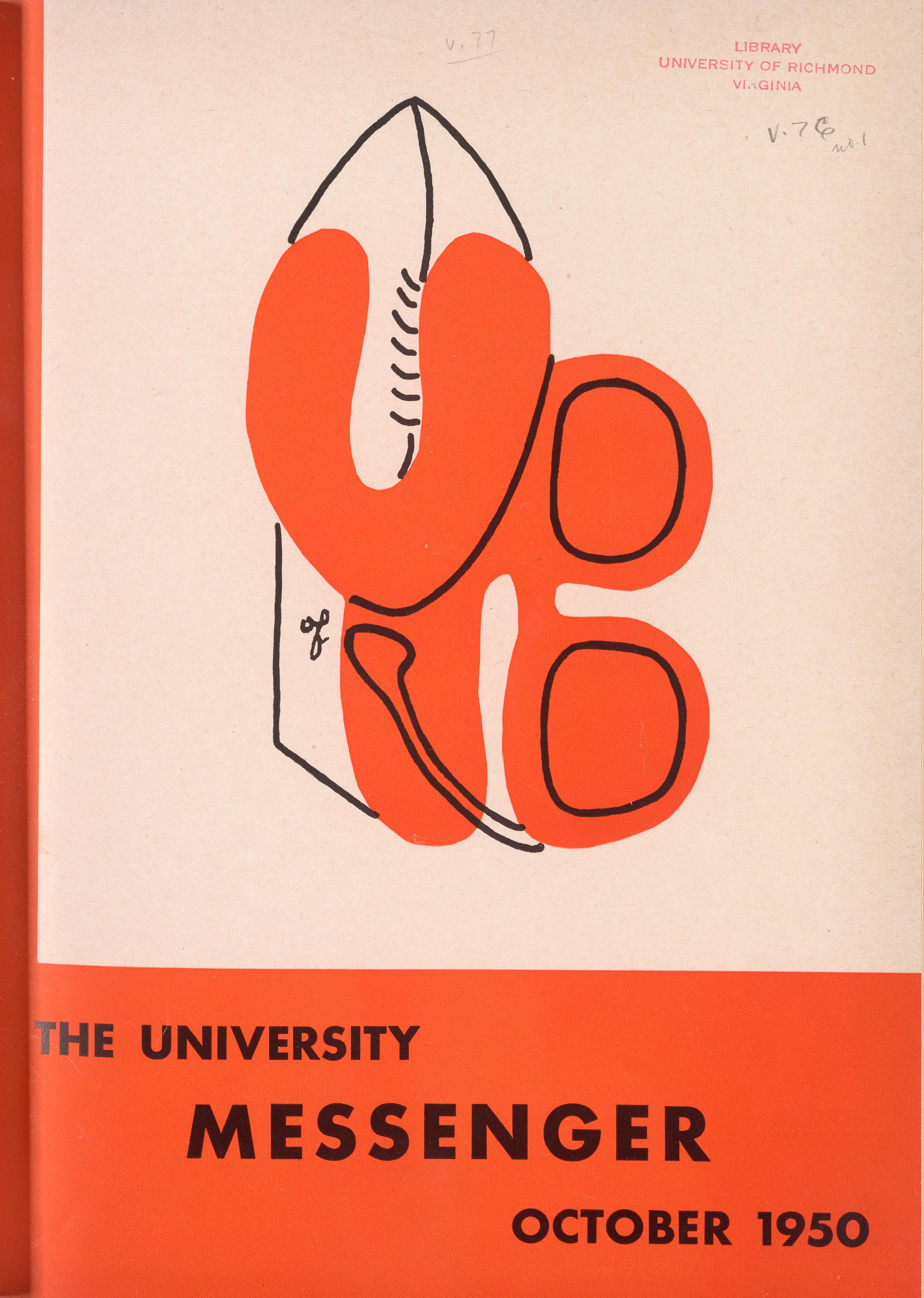

HE UNIVERSITY MESSENGE
EDITORIAL OFFICERS
Editor-in -Chie f
BETTY B. CATHER
Richmond College Editor
DICK FITZ
Westhampton College Editor
WRIGHT
L aw School Editor
DON THOMPSON
Business Manager AL PITTMAN
L ayout Editor LEA THOMPSON
Art Editor
WATERS
Exchange Editor MARYGLEN COOPER
Pat Atwill, Kay Beale, Bob Chadwick, Doug Clark, Barbara Ferre, Susie Gibson, Rene Groves, John Hamilton, Lea Hunter, Liz Latimer, Robert McKinny , Mary Lee Moore , George Tutwiler, Andy Wesley.
The University of Richmond MESSENGER
This month our cover, by Millie Waters, features a football, a book and a pair of horn-rimmed glasses that spell fall. But more than that it spells U of R . That the football tops both the book and the horn rims is purely a matter of design and is not to be taken as symbolic of fall at th e University-academically speaking. By the same token , the color orange carries no Freudian connotation.
Printer-Garrett & Massie, Inc.


MEMOIRSOF A FRAT PIN
By MARY LEE MOORE
XAM a fraternity pin. Although I lack many of the jewels owned by my more sophisticated cousins , I think I'm something pretty special. In an y case, I've been around enough to realize I have enough of what it takes to attract the kind of attention that always proves to be interesting . My travels have been confined merely to my tran sfer from male to female , but, at present, my ad dress seems to be one of a more permanent nature . I am residing at Westhampton College with a coed named Betty; and although it is a great and definitely diverting experience , you can ' t imagine how difficult it is for me to become adjusted to this new environment after spending the greater part of my life in Thomas Hall.
It' s hard to remember when I really began my life . Naturally, I was too young to remember my birt h; but a t the age of several months , I became aware of my prosaic surroundings. I vaguely remember traveling long distances in a small , stuffy box that caused me to develop a most annoying case of claustrophobia.
I w as an individual the night of fraternity initiation, when I became an integral part of the fun and goo d fellowship prevalent among such groups It was not until then that I had an opportuni ,ty to spread my chain and join the fast moving U. of R. campu s world I belonged to a swell guy named Joe, and we were good buddies from the beginning. Onl y occasionally would he leave me behind because of neglect or carelessness, except when he went ou:t with a girl called Rita. I'd sit despondenrtly on his cashmere sweater and sulk while he went out dressed in proper Richmond College date style (I mean a coat and tie, boys, not jeans and a tee sh irt) . After learning the reason for my not accompanying Joe, I not only felt better, but was aotuall y amazed. The girl named Rita wanted me; and since Joe wasn ' t in for a loss so soon in the game, I spent many a boring night amidst the clutter of his overladen dresser.
My former innocence was gradually being replaced by a naive worldly wiseness , but occasionally I'd lose that newly assumed air. For instance , there was the time I broke my clasp and went hurtlrng down the drain. Feeling that cold, murky water , I g ot panicky and barely had presence · of OCTOBER, 1950
mind enough to wrap my chain around a pipe and wait the inevitable rescue by an angry master. The language I employed, upon being fished out by a very amateur plumber, belied the naivete of my younger days. I was growing up and learning fast!
Tragedy struck me the night Joe took me along to see Rita . Of course nobody can deny the fact that it was a great party and that my friend, Joe, was becoming more and more enamored with these cer,tain feminine charms. It amused me to see him murmur lovingly into her scented ear while she covetously looked at me with greed in her green eyes. He would kiss her passionately and she would simply ignore him. The rubbing of her crimson claws over my delicate body gave me the fiendish desire to stick her. Although I admired her accentuated assets, she impressed me as being unworthy of a good boy like Joe It was , however, beyond my control, when after several hours and beverages, I was presented to that grasping female in the darkness of a swerving car. Joe, lacking the coordination necessary to my transfer from the starched stiffness of his shirt to the clinging texture of her silk dress, placed me in a very precarious position. I squirmed wirth embarrassment until I was a!ble to maneuver into a somewhat less obvious location. Thus, the night wore on.
The very next day, wi,th mixed emotions of surprise and reluctance, I retraced my steps from dress to shirt-needless to say, the contrast was startling. My one night adventure had given me, at last, concrete grounds to consider myself as being mature .
The days passed, little happening beyond routine classes, games, and parties. Then Joe met Betty, and with remarkable foresight, I realized I was not long for Joe and Thomas Hall. To tell the truth, the thought was not distasteful to me-I longed for bigger and more exciting advantages . Betty, lacking the obvious eagerness of former girls , gave us a hard time, but we didn ' t give up the fight. However, after weeks of extravagant and intensive wooing, I was still a resident of Richmond College. Joe? Well , he resided with me in body but his spirit had become firmly attached to Westhampton.
( C ontinued on p age 13 )
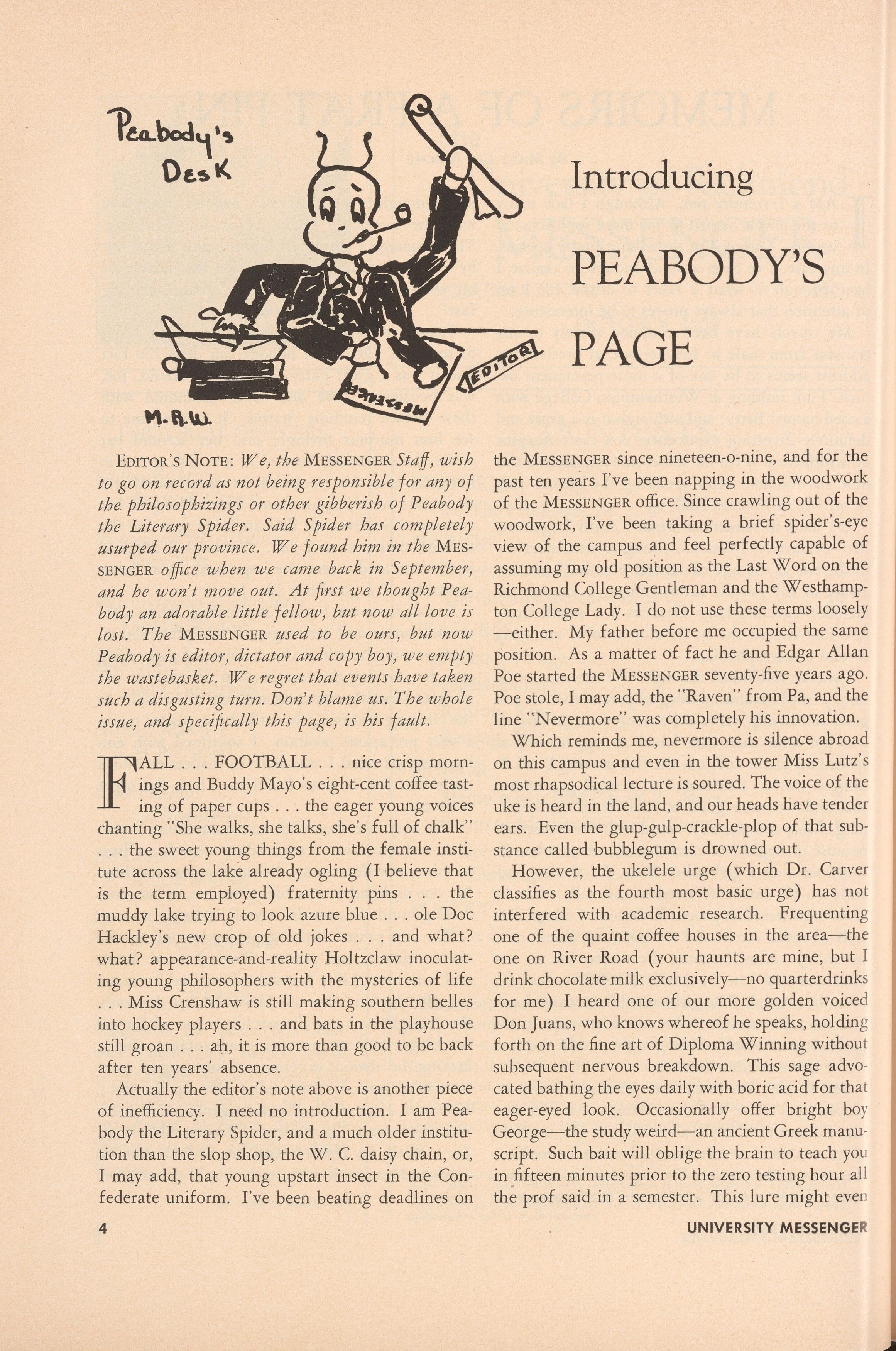
EmToR's Norn: We , the MESSENGERStaff, wish to go on record as not being responsible for any of the philosophizings or other gibberish of Peabody the Literary Spider. Said Spid er has complet el y usurped our provinc e. We found him in the MESSENGERoffice when we came back in Sept ember , and he won ' t move out. At first we thought Peabody an adorable littl e fellow , but now all love is lost. The MESSENGERused to b e ours, but now Peabody is editor , dictato r and copy boy , we empty the wastebasket. We regret that events hav e tak en such a disgusting turn. Don't blame us. The whole issue, and specifically this page , is his fault.
FALL ... FOOTBALL ... nice crisp mornings and Buddy Mayo's eight-cent coffee tasting of paper cups ... the eager young voices chanting "She walks , she talks, she ' s full of chalk " ... the sweet young things from the female institute across the lake already ogling (I believe that is the term employed) fraternity pins . . . the muddy lake trying to look azure blue ... ole Doc Hackley' s new crop of old jokes . . . and what? what? appearance-and-reality Holtzclaw inoculating young philosophers with the mysteries of life
. Miss Crenshaw is still making southern belles into hockey players ... and bats in the playhouse still groan ... al;i , it is more than good to be back after ten years ' absence.
Actually the editor's note above is another piece of inefficiency I need no introduction. I am Peabody the Literary Spider, and a much older institution than the slop shop, the W. C. daisy chain, or, I may add, that young upstart insect in the Confederate uniform . I've been beating deadlines on 4
Introducing PEABODY'S PAGE
the MESSENGERsince nineteen-a-nine, and for the past ten years I've been napping in the woodwork of the MESSENGERoffice. Since crawling out of the woodwork, I've been taking a brief spider ' s-eye view of the campus and feel perfectly capable of assuming my old position as the Last Word on the Richmond College Gentleman and the Westhampton College Lady. I do not use these terms loosely -either. My father before me occupied the same position. As a matter of fact he and Edgar Allan Poe started the MESSENGERseventy-five years ago . Poe stole, I may add, the "Raven " from Pa, and the line " Nevermore " was completely his innovation. Which reminds me, nevermore is silence abroad on this campus and even in the tower Miss Lutz 's most rhapsodical lecture is soured. The voice of the uke is heard in the land , and our heads have tende r ears. Even the glup-gulp-crackle-plop of that substance called bubblegum is drowned out.
However , the ukelele urge (which Dr. Carve r classifies as the fourth most basic urge) has no t interfered with academic research. Frequentin g one of the quaint coffee houses in the area-th e one on River Road (your haunts are mine, but I drink chocolate milk exclusively-no quarterdrink s for me) I heard one of our more golden voiced Don Juans , who knows whereof he speaks, holdin g forth on the fine art of Diploma Winning withou t subsequent nervous breakdown . This sage adv ocated bathing the eyes daily with boric acid for tha t eager-eyed look. Occasionally offer bright boy George - the study weird-an ancient Greek manuscript. Such bait will oblige the brain to teach you in fifteen minutes prior to the zero testing hour all the prof said in a semester. This lure might even UNIVERSITYMESSENGER
influence George to give you an old term paper which, by changing every fourteenth word, is adequate. Ah wisdom, how they warp you.
It reminds me of a slice of rather crisp Bacon (Sir Francis, circa 1700)-"To spend too much time in studies is sloth; to use them too much for ornament is affected; to make judgment wholly by their rules is the humor of a scholar." Rehashing Bacon, I find that those among our number who are affected, slothful, and / or humorous are in such minority that I suggest as a class project for the W. C. fair ones an embroidering en m ass e of said mo ttoes to bedeck the classrooms of both institutions .
While on the subject of sophomoric pastimes , I cannot understand why ratting has not included the big concrete cylinders that guard the excavation for that befabled student Ad Building . Great sport to make the £rashes roll said cylinders up the Westhampton hill to be released suddenly The sadists among the sophomores could enlarge on the idea .
A leo pard does so change its spots. One just passed the window. Obviously the wearer , an RC man, h as been seeing too many Cecil B deMille cinemas I understand that the prexy of the institute has appointed a committee to investigate the cost of hav ing g raduation mortarboards covered with leopa rd fabric - for a plushier send-off . These endearing academic fads.
Ah , bra ve new world that has such colleg iates in it.
- P EABODY.
Muse No. 10 - Tobacco Trance
A pack of ciga r ett es, a m atch - h ow odd !
T hat in our mo d ern age supr em e sh ou ld rul e
K ing N icot in e, t h e Y ell ow-fin ge red go d ,
T h e dei t y, f or p oe ts , an d a t oo l
'' When, in d isg race with Fortu ne an d men' s eyes, · ,
We wou ld comp os e, r emember, or f orge t ,
We' ve bu t t o l et th e vo ti11e ince ns e rise
From f u m ing pip e, cigar, or cigarett e,· ·
A nd in t h e d rie d en sl avi n g w eed is f ound
T h e final p an acea: w e i n h al e;
T h e smo uld erin g oris ons r epl ctce th e sou nd
Of ot h er pr aye rs, h old s ol ace if we f ail.
To bacco br ed of Earth , Pr om et h ean fir e
T hus mee t an d int ermin g l e : go ds re t ire
OCTOBER, 1950
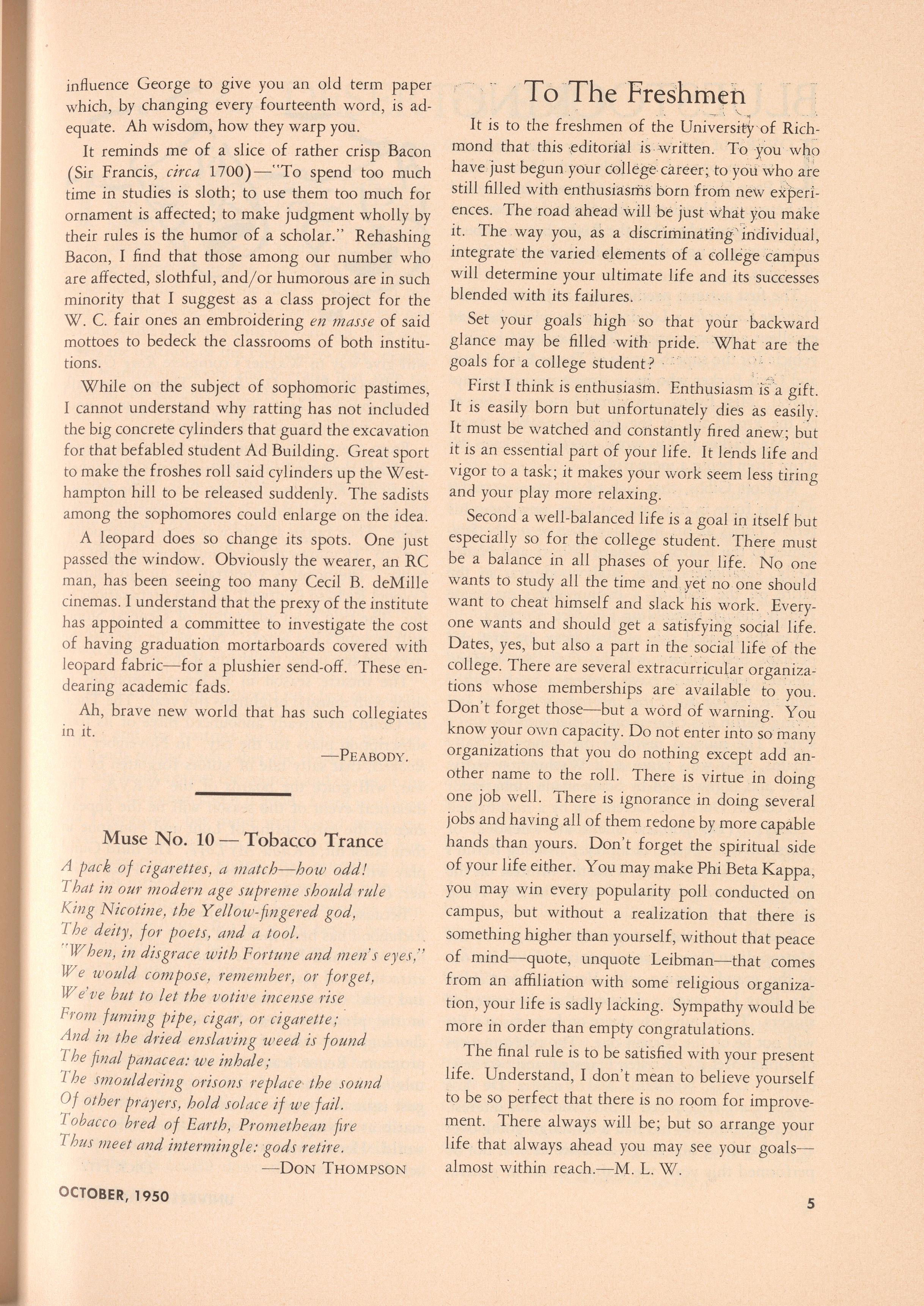
- DON THOMPSON
·· , To The Freshmen
-· :, \... .,
It is to the freshmen of the Universit,y of Richmond that this -editorial is .\vritten. To you wh o have just begun your collegecareer; to yoi.i\vho a~e still filled with enthusiasms born from new ekperiences The road ahead will be just \Vhat you make it. The way you, as a discriminating ' °ln:dividual, integrate the varied elements of a college c:ampus will determine your ultimate life and its successes blended with its failures . .
Set your goals high so that your backward glance may be filled with pride. What are the goals for a college student? · ·
First I think is enthusiasm Enthusiasm , isagift. It is easily born but unfortunately dies as easily. It must be watched and constantly fired arie~; but it is an essential part of your life. It lerids life and vigor to a task; it makes your work seem less tiring and your play more relaxing. ·
Second a well-balanced life is a goal in itself but especiall y so for the college student. There must be a balance in all phases of your life ·No one wants to study all the time and y~t no one should want to cheat himself and slack his work. Everyone wants and should get a satisfying socjal life. Dates , yes, but also a part in the social life 9f the college. There are several extracurricular organizations whose memberships are available to you. Don ' t forget those-but a word c:ifwarning . You know your ow n capacity. Do not enter into so many organizations that you do nothing except add another name to the roll. There is virtue in doing one job well. There is ignorance in doing several jobs and having all of them redone by more capable hands than yours. Don't forget the spiritual side of your life either. You may make Phi Beta Kappa , you may win every popularity poll conducted on campus, but without a reali zation that there is something higher than yourself , without that peace of mind - quote , unquote Leibman - that comes from an affiliation with some religious organization , your life is sadly lacking . Sympathy would be more in order than empty congratulations
The final rule is to be satisfied with your present life Understand, I don ' t mean to believe yourself to be so perfect that there is no room for improvement. There always will be ; but so arrange your life that always ahead you may see your g oalsalmost within reach. - M . L. W.
BLUESTOCKING ]C
VERS of the burlesque may claim that the season opened last July with Mike Todd's Peep Show , a mixture of rowdy humor and the besequined lovelies of the chorus, but it was not until late September that the Rialto began to buzz with activity as new shows opened along the Street of Lights.
The first autumn production was James Bridie's Daphn e Laureola , a London success which has had excellent advance notices. The play itself is but a vehicle for the superb acting of Dame Edith Evans and Cecil Parker who have almost unanimous approval. Miss Evans , considered by some critics to be the First Lady of the English-speaking stage , and Mr. Parker had to work overtime to keep the script from being a mere trifle.
Wolcott Gibbs, that jack of all literary trades with his forte in dramatic criticism , now faces his fellow critics as his first play, Season in th e Sun , comes to the boards . Richard Whorf and Nancy Kelly , vacationers from Hollywood , star in the satire on ,the staff of a cosmopolite' s magazine ( oddly enough resembling Th e N ew York er).
On the musical side of Broadway the first and perhaps best entrant will be Call Me Madam. Lindsay and Crouse have written a book with a definite regard for Ethel Merman ' s talents , and Irving Berlin has created music that suits the star ' s style. The musical involves the doings of Sally Adams , who wins fame as a Washington partygiver and is rewarded by being made ambassador to a certain Duchy of Lictenburg by a man named "Harry ." (No political slams are intended , of course, in this " pearl" of a play.) Among Berlin's songs are "The Hostess With the Mostest on the Ball , " "Marrying for Love ," and " The Best Thing for You Would Be Me."
Rudolf Bing , the new general manager of the Metropolitan Opera, has announced November 6th as the grand opening with Verdi's Don Carlos Mr Bing has made a drastic cut in the roster of singers. Thirty-nine who were on last season's list will not be on the current one. The performances of former Met star , Kirsten Flagstad, and two newcomers, Elena Nidolaidi and Victoria De Los Angeles, are anticipated with considerable interest. The repertoire also has had a thorough going-over at the hands of Mr . Bing. La Boheme will not be performed this year; the Italian works in general
6
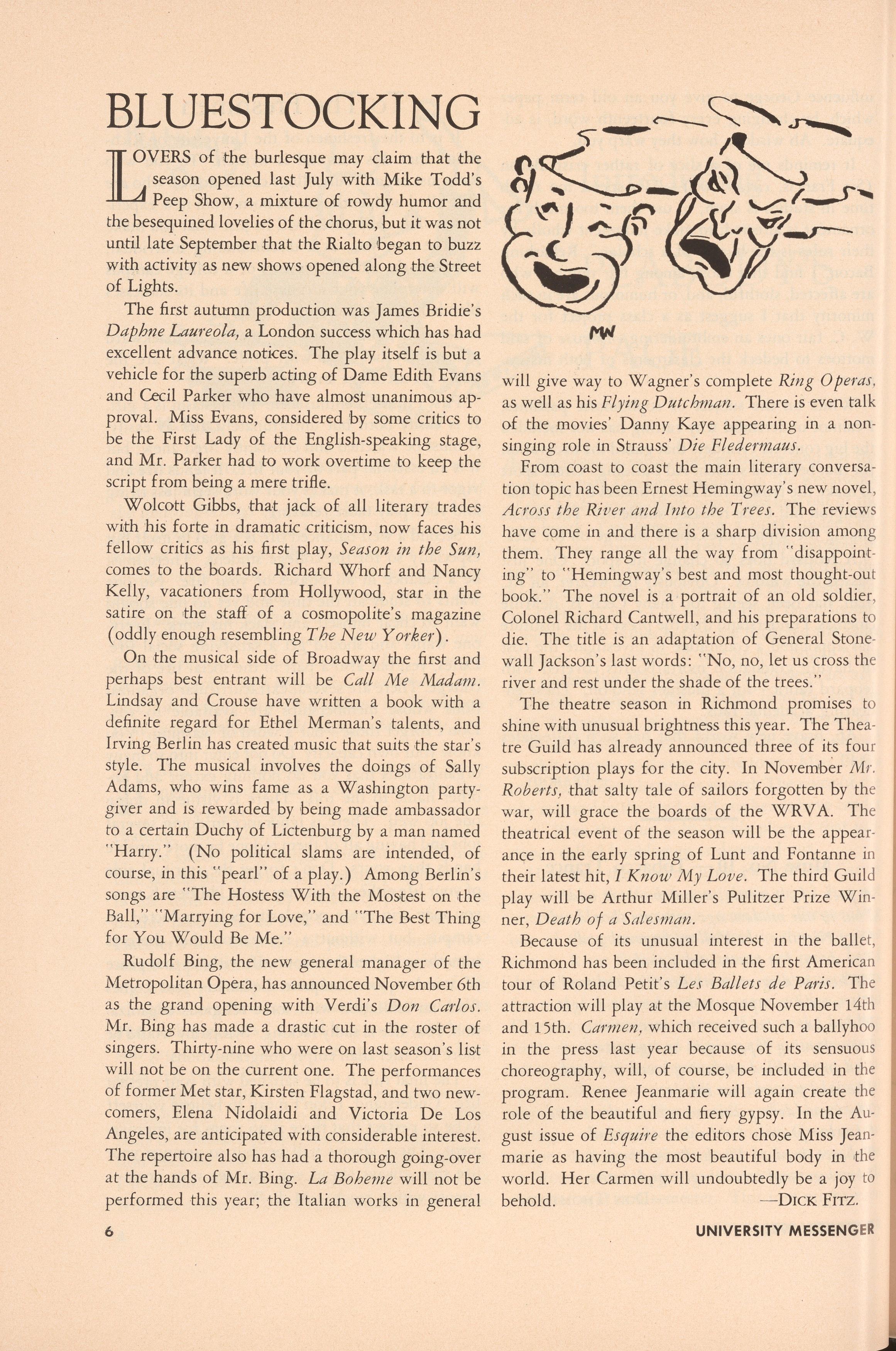
M,t/
will give way to Wagner's complete Ring Op eras , as well as his Flying Dutchman. There is even talk of the movies ' Danny Kaye appearing in a nonsinging role in Strauss ' Die Fl ede rmaus.
From coast to coast the main literary convers ation topic has been Ernest Hemingway ' s new novel , Acr oss th e Ri v er and Into th e Tr ees The review s have come in and there is a sharp division amon g them. They range all the way from "disappoin ting" to "Hemingway's best and most thought-ou t book. " The novel is a portrait of an old soldier , Colonel Richard Cantwell , and his preparations to die. The title is an adaptation of General Ston ewall Jackson ' s last words: "No , no, let us cro ss th e river and rest under the shade of the trees."
The theatre season in Richmond promises to shine wi,th unusual brightness this year. The The atre Guild has already announced three of it s fou r subscription plays for the city. In November M r Rob erts, that salty tale of sailors forgotten by th e war , will grace the boards of the WRVA. Th e theatrical event of the season will be the appe arance in the early spring of Lunt and Fontanne in their latest hit, I Kn ow M y Lov e The third Guil d play will be Arthur Miller ' s Pulitzer Prize Wi nner , D eath of ct Sal esman
Because of its unusual interest in the ball et, Richmond has been included in the first Americ an tour of Roland Petit's Les Ballets de Paris. T h e attraction will play at the Mosque November 14t h and 15th. Carm en , which received such a ballyh oo in the press last year because of its sensuo us choreography , will, of course, be included in the program. Renee Jeanmarie will again create the role of the beautiful and fiery gypsy. In the August issue of Esqu ire the editors chose Miss Je anmarie as having the most beautiful body in ,the world. Her Carmen will undoubtedly be a joy to behold . - DICK FITZ.
UNIVERSITYMESSENGER

DESERT'SEND
By ROBERT CHADWICK
THE night is dark and overcast. There are no stars. The afternoon-formed clouds glide heavily over the half-circle of the heavens. T hey blacken the night and stand still beside the rustling palmettos on ,the roadside The bushes make noise and watch the man walking and tell h im they are there. He gives them not his eye nor ear but walks and hurts with his walking. The man wears the uniform of the Florida-cowpoke: expensive, wanted-for boots and overalls that give no for ce -to the imagination He walks and wants to ru n , but his leg has a knife-gash seared in it, and he is slowed to a limp and is afraid.
T wenty or twenty-five miles west of Fort Pierce, Florida , there is a crossroad. Coming from the coast and turning north leads to Orlando and the cattle country . About the other two pointers of the intersection, it does not matter. The crossroad is called Desert's End, and although there is not a desert in Florida , the place is so desolate that its name is not questioned. At the crossroad there is an all-night diner. It is a low squatty building which gives no heed to architecture or the practical in i ts formation Yellow light beacons out from its . windows and the multicolored juke box tells civilization of "Bonaparte ' s Retreat. " There are no customers and the waitress stands shifting her feet , her hands telling each other the tension that is in her . She leans against the counter and thinks of the man : she loves him and it is good. I lo ve you I love you I l ove y ou , her mind works and slows the physical into an alcoholic state. She thinks of him and loves him and knows that everything has found its orbit when his skin quivers on hers and the pulse of life is found in love-weariness when the quivering halts. But he is not beside her and she desires him and two truck drivers want coffee to make the night less sleepy.
Coffee, they say, and she looks at them and finally she sees them. She goes to the large urn behind the counter and pours the brown liquid and sets two steaming cups before them. They sip 1t · slowly at first, it is hot , and then ,their nerves adjust themselves and the coffee pours more easily. She watches them and hopes that they will not talk to her, but one of the men turns to her and ,tells her a story he has caught down the road. She hears OCTOBER, 1950
about a knife and how one man hated another man and dug a knife into him. And she knows why the man is not beside her, and her jaw muscles grow taut and cry for relief. But she listens intently and shows interest, and dissolves inside, knowing that the night is black and there is no light anywhere.
The truck drivers finish their coffee and give her their money and start their motors and speed toward their destination. She is alone. Her face is shown haggard in the wavy mirror above rthe lunch counter. But a shuffling of gravel outside erases the lines of her face and she moves to the door.
She stands silently in the doorway and watches the man as his moving toward her takes energy from him and gives impetus to his moving. Suddenly she runs ,to him and they are together: a,s if there were nothing in the world but the man and the girl. And in their contact n:vo blood-beats pound into unity and they move as one inside the all-night diner. They stand together and exchange the greeting with the age-old meaning. All the worry-strain has fled from her face and she is content with his nearness. He clings to her and cries and she knows that murder is of ten an act committed when the grooves of the brain have missed an eleotric contact-only that and nothing more. The man cries and tells her why a knife became his master and killed another man, but it does not matter to her.
She asks the man if he wants coffee, and knowing that is wrong, she opens a drawer in .the lunch counter and brings out a bottle df whiskey. They drink together and feel comforted as the hot arriber liquid bums into their blood. It i~ a gqod Jhing , whiskey, when your world explodes. ·
They drink until the bottle is half gone and they feel their falsified strength, and think they are God and can kill and run away and know that they can not. A truck motor buzzes up to the all-night diner and they greet its coming with a fear that is numbed into absurdity by the whiskey The truck stops and a man in white trousers and a "t'' -shirt climbs down from the cab and walks to the building. Be enters and says hello to her ind nods to the man. The girl knows him because he is a regular
(Con tinu ed on p ag e 15)
AUTH01t's ,NoTE: I wish to ar edge rny debt to Henry WaJ Longfellow whose hand I he/ writing this ,rpot m."
Tell me not 1 in mourn/ ul numbers School is but a life of queues-.. For my time not spent in slumbers Finds me paying college dues.
Rows iu front of Wheeler's office l 'viust be passed to pay yam fines ) Then across the Gothic campus To the Gym stefs-and more lines.
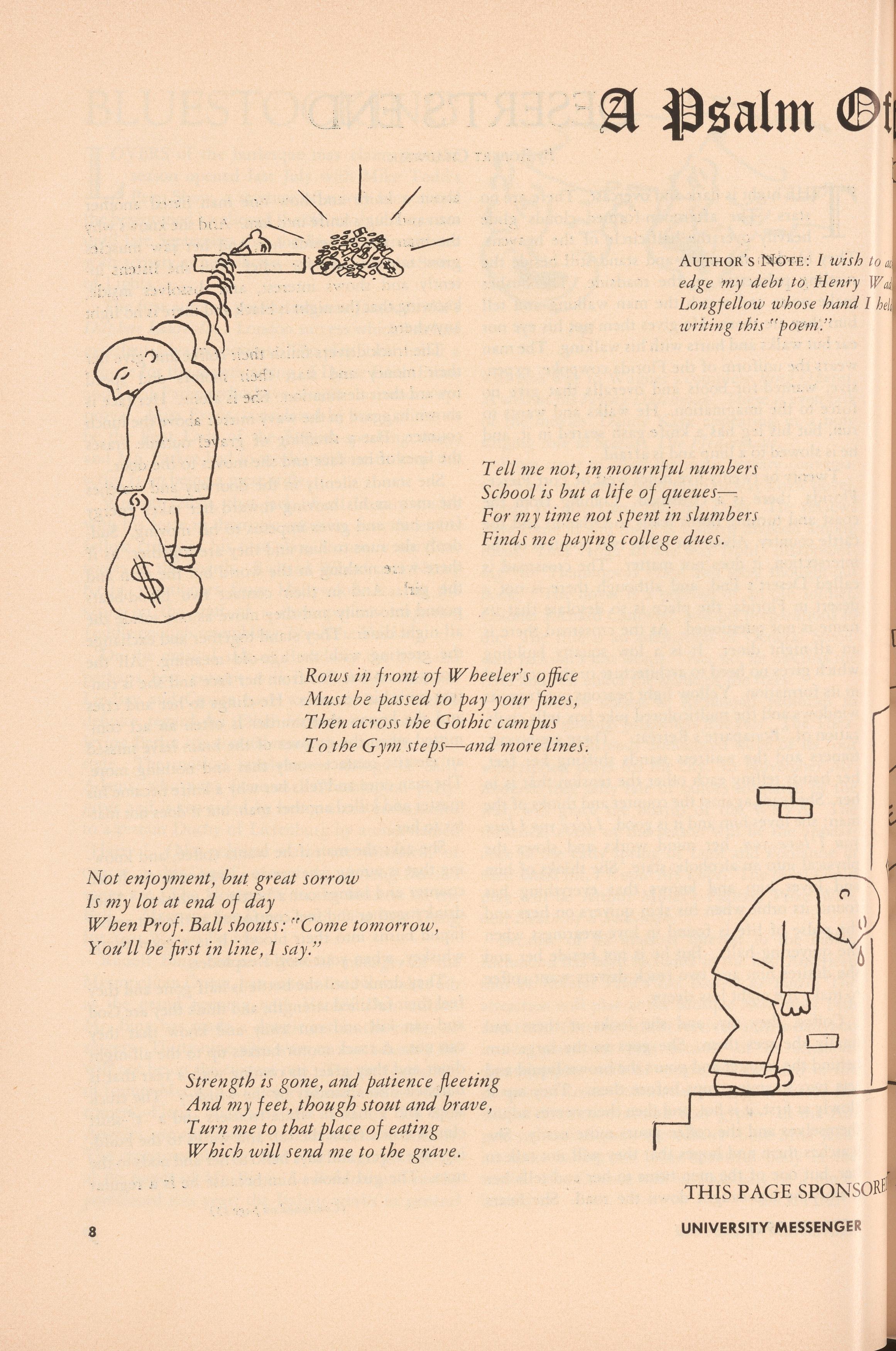
Not enjoyment) but great sorrow Is my lot at end of day When Prof. Ball shouts_:rrcome tomorrow ) You)ll be first in line) I say/) 8
Strength is gone) and patience fleeting And my feet) though stout and brave ) Turn me to that place of eating Which wi~l send me to the grave.
'culatton
In the midst of table battle
JVhen a pie lands on my head, Do I sulk while tin cups rattle? No, I throw it back, instead.
Comes the morrow, howe' er pleasant
You will find me in my place, Twenty paces from the Chem lab. M.D.'s staring in my face.
Deans ttnd Smctrt, they all remind me, rrNext year there will be no line."
But till next year, will you pass me Ointment for these feet of mine?
Ointment, that perhaps another, Standing in the sheets of rain, A forlorn and sore -f oat brother, Seeing, shall take heart again. t
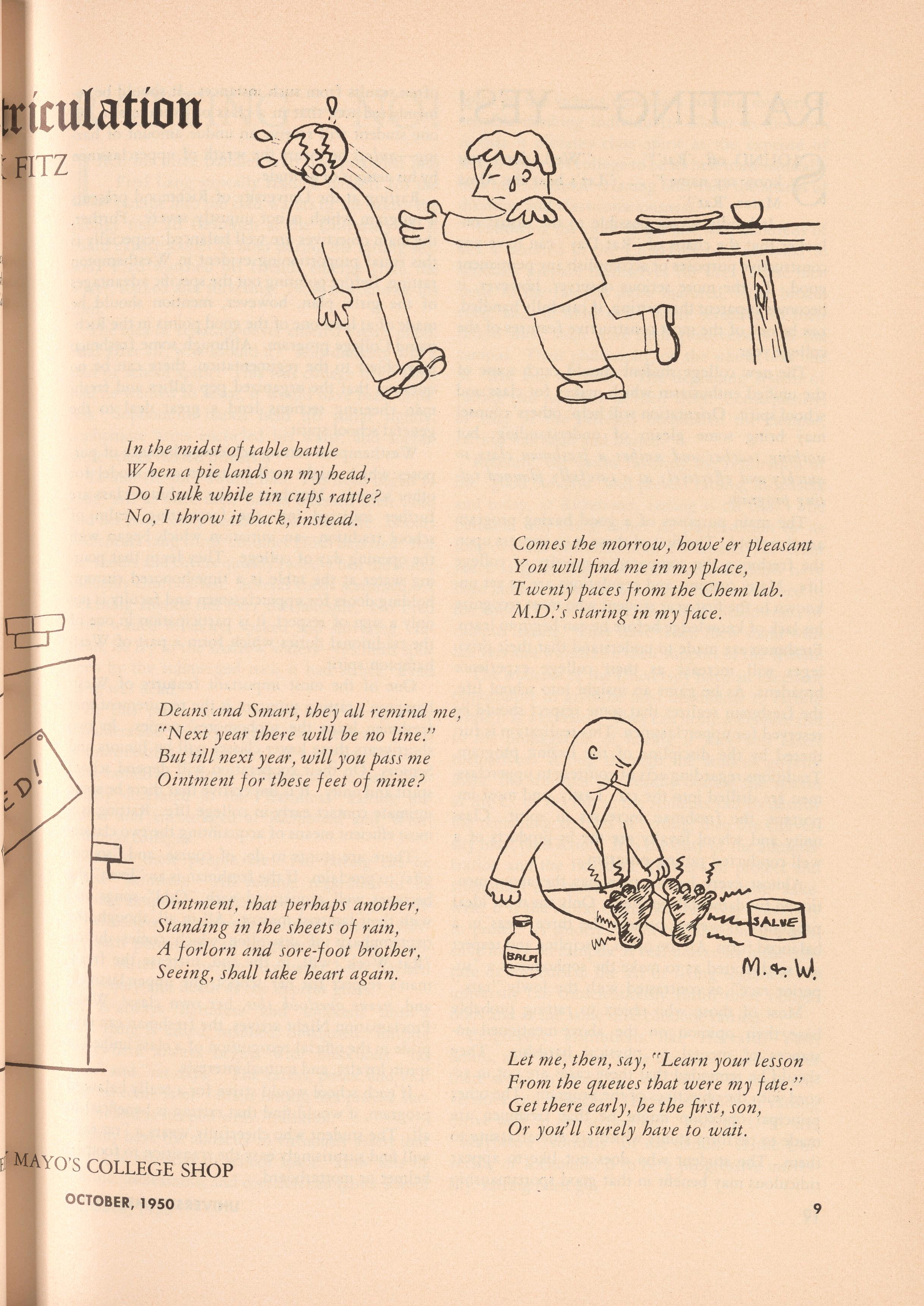
Let me, then, say, rrLearn your lesson From the queues that were my fate."
Get there early, be the first, son, Or you'll surely have to wait. 9
RATTING-YES!
SOUND off, 'Rat'!" . . . "Well, don't you know my name?" ... " Let's hear the Alma Mater, 'Rat'!" ... . It hardly seems possible to the casual onlooker that the chaos of "Rat Day" can have any constructive purposes or accomplish any permanent good. To the more serious observer, however, it becomes apparent that ratting, if carefully handled. can be one of the most constructive features of the college year.
The new college student should catch some of the unified enthusiasm which makes for class and school spirit. Orientation will help; others ' counsel may bring some gleam of understanding; but nothing teaches and unifies a freshman class so quickly and eff ectivel y as a ca1ef11lly planned ratting program.
The main purposes of a good hazing program are threefold. The first of these i.s to impress upon the freshman the comparative novelty of college life. Many customs and regulations are as yet unknown to the first-year student who must recognize his lack of knowledge before he can begin to learn. Freshmen are made to understand that their privileges will increase as their college experience broadens. As he gains an insight into school life , the freshman realizes that some respect should be reserved for upperclassmen. This realization is furthered by the discipline of the hazing program Traditions regarding acts of courtesy to upperclass,. men are drilled into the rat. Lastly, and most important, the freshman increases in spirit. Class unity and school loyalty are the by-products of a well-conducted ratting program
Almost every hazing plan has the above-mentioned fundamentals in mind . Only the most ideal programs, however, present the three ideas in a balanced form. All too often , discipline and respect are so distorted as to make the sophomores a "superior race " as contrasted with the lowly "rats. "
Most of those who object to ratting probably base their opinion on the above-mentioned instances of mental or physical hardship. They should be remi!)ded that these cases are not in accord with the objectives of the program . The other principal objection might be that freshmen are made to perform stunts which are embarrassing to them. The student who does not like to appear ridiculous may benefit in that good sportsmanship
10
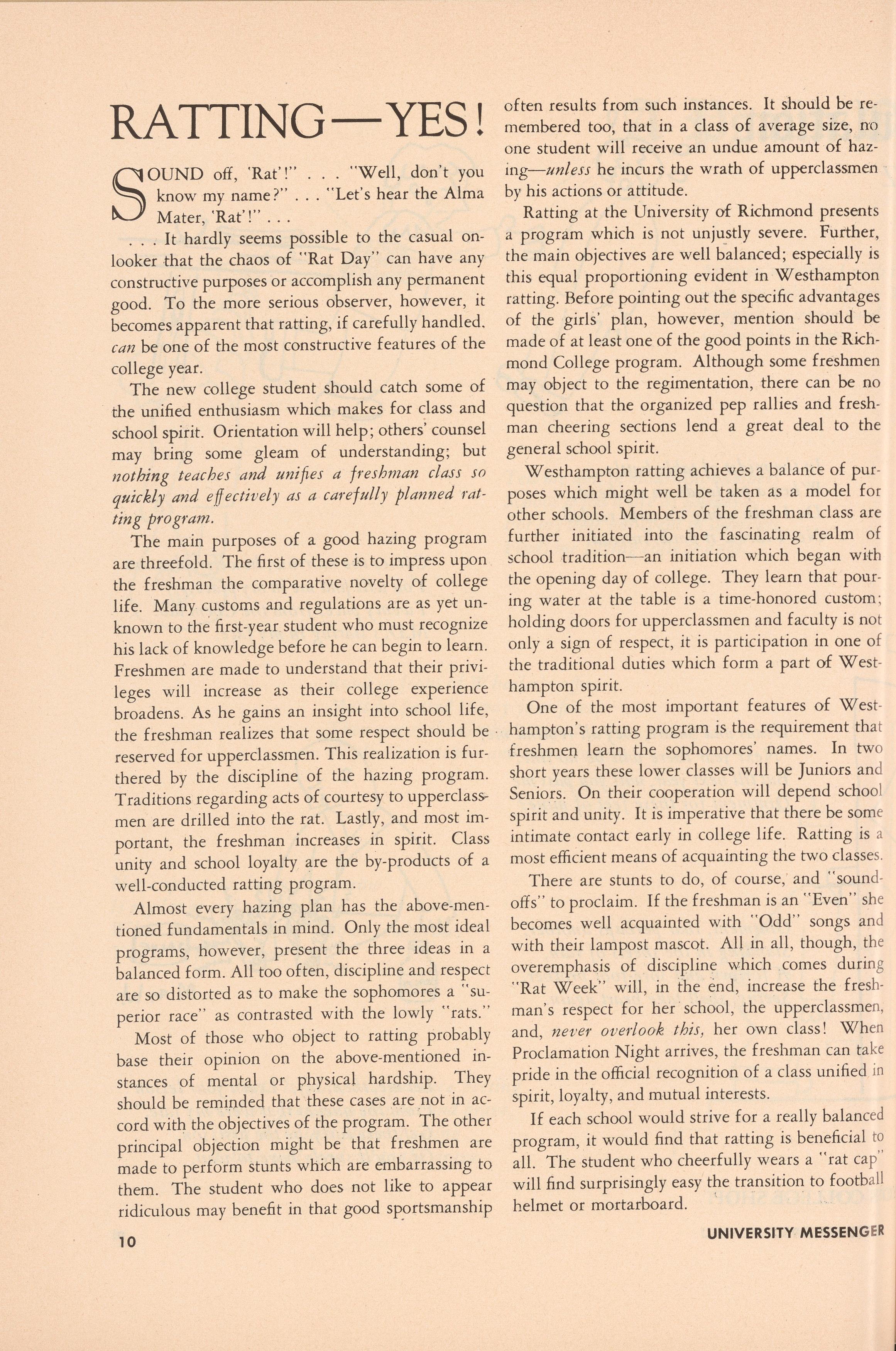
often results from such instances. It should be remembered too, that in a class of average size, n-o one student will receive an undue amount of hazing-unless he incurs the wrath of upperclassmen by his actions or attitude.
Ratting at the University of Richmond presents a program which is not unjustly severe. Further , the main objectives are well b-alanced; especially is this equal proportioning evident in Westhampton ratting. Before pointing out the specific advantages of the girls' plan, however, mention should be made of at least one of the good points in the Richmond College program. Although some freshmen may object to the regimentation , there can be no question that the organized pep rallies and freshman cheering sections lend a great deal to the general school spirit.
Westhampton ratting achieves a balance of purposes which might well be taken as a model fo r other schools . Members of the freshman class are further initiated into the fascinating realm of school tradition - an initiation which began with the opening day of college They learn that pouring water at the table is a time-honored custom ; holding doors for upperclassmen and faculty is no t only a sign of respect , it is participation in one of the traditional duties which form a part of Westhampton spirit.
One of the most important features of Wes thampton's ratting program is the requirement th at freshmen learn the sophomores ' names. In tw o short years these lower classes will be Juniors an d Seniors. On their cooperation will depend school spirit and unity. It is imperative that there be some intimate contact early in college life. Ratting is a most efficient means of acquainting the two classe s.
There are stunts to do, of course , and "soun doffs" to proclaim . If the freshman is an "Even" she becomes well acquainted with " Odd " songs and with their lampost mascot. All in all , though , th e overemphasis of discipline which comes duri ng "Rat Week " will, in the end , increase the fres hman ' s respect for her ·school, the upperclassme n, and, never overlo ok this , her own class! Wh en Proclamation Night arrives , the freshman can ta ke pride in the official recognition of a class unified in spirit, loyalty , and mutual interests.
If each school would strive for a really balan ced program, it would find that ratting is beneficial to all. The student who cheerfully wears a "rat cap" will find surprisingly easy the transition to footb all helmet or mortarboard. ' · UNIVERSITYMESSENGER
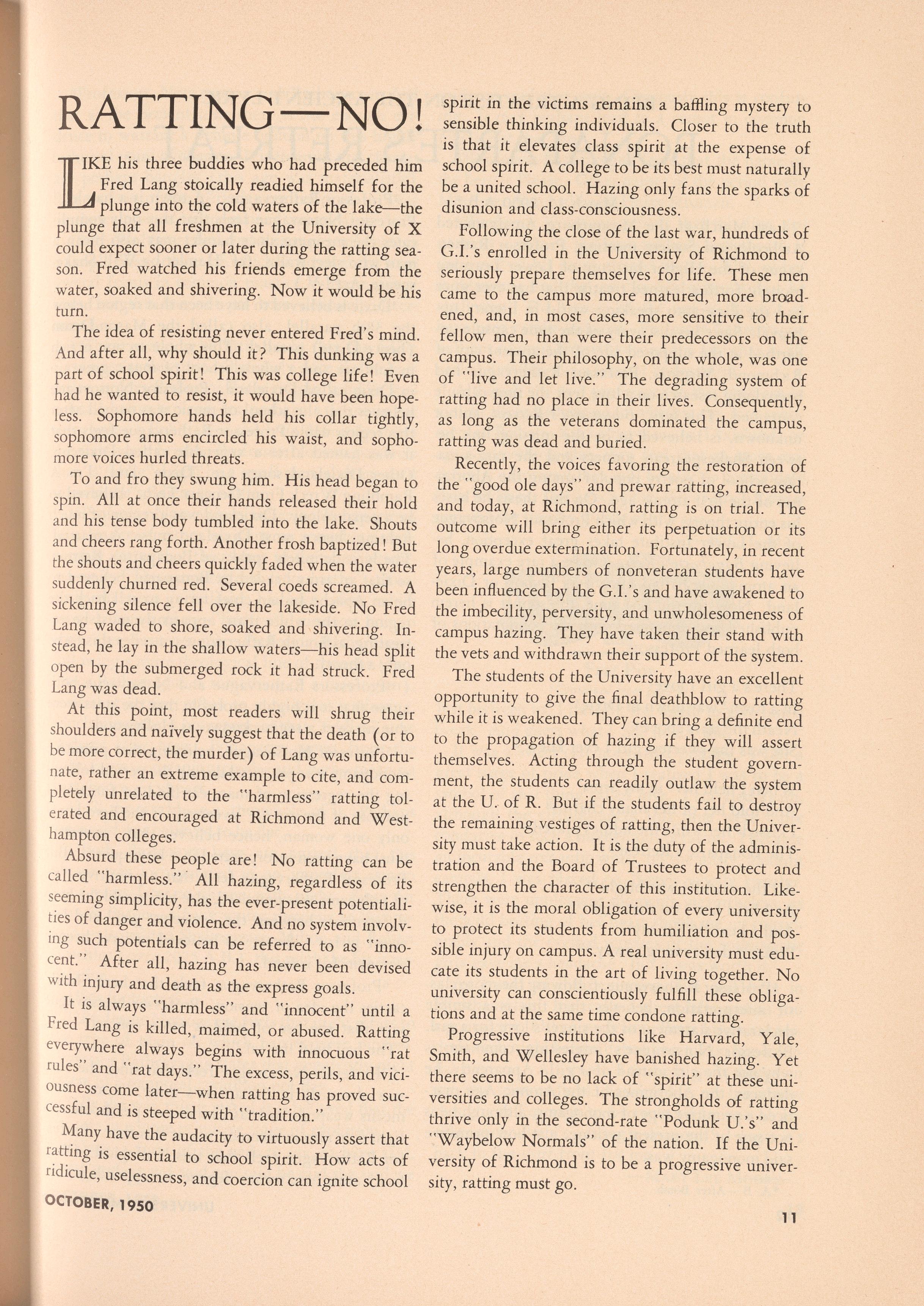
RATTING-NO!
CE his three buddies who had preceded him Fred Lang stoically readied himself for the plunge into the cold waters of the lake-the p lunge that all freshmen at the University of X could expect sooner or later during the ratting season . Fred watched his friends emerge from the wa ter, soaked and shivering. Now it would be his turn.
T he idea of resisting never entered Fred's mind And a fter all , why should it? This dunking was a par t of school spirit! This was college life! Even had he wanted to resist, it would have been hopeless. Sophomore hands held his collar tightly , soph omore arms encircled his waist , and sophomore voices hurled threats.
To and fro they swung him . His head began to spin. All at once their hands released their hold and his tense body tumbled into the lake . Shouts and cheers rang forth. Another frosh baptized! But the shouts and cheers quickly faded when the water suddenly churned red. Several coeds screamed. A sicken in g silence fell over the lakeside . No Fred Lang wa ded to shore , soaked and shivering. Instead, h e lay in the shallow w a ters-his head split open by the subme rg ed rock it had struck . Fred Lang was de a d
At this point , most readers will shrug their shoul d ers and nai:vely suggest that the death ( or to be mo re correct , the murder) of Lang was unfortunate, ra ther an extreme example to cite , and completely unrelated to the " harmless " ratting t olerated and encouraged at Richmond and Westhampton colleges
Absu rd these people a re! No ratting can be called " harmless ." · All hazing , regardless of its seeming simplicity , has the ever-present potentialities of d ang er and violence. And no system involving such potentials can be referred to as " innocent." After all , hazing has never been devised with inj u ry and death as the express goals.
It is a lways " harmless " and "innocent " until a Fred Lang is killed , maimed, or abused. Ratting everywhere always begins with innocuous " rat rules" and " rat days ." The excess, perils, and viciousness come later-when ratting has proved successful and is steeped with " tradition. "
Many have the audacity to virtuously assert that r~t~ing is essential to school spirit. How acts of n dicule, uselessness , and coercion can ignite school OCTOBER,19S0
spirit in the victims remains a baffling mystery to sensible thinking individuals. Closer to the truth is that it elevates class spirit at the expense of school spirit. A college to be its best must naturally be a united school. Hazing only fans the sparks of disunion and class-consciousness .
Following the close of the last war, hundreds of G.I.'s enrolled in the University of Richmond to seriously prepare themselves for life. These men came to the campus more matured, more broadened, and, in most cases, more sensitive to their fellow men, than were their predecessors on the campus. Their philosophy , on the whole, was one of "live and let live ." The degrading system of ratting had no place in their lives Consequently , as long as the veterans dominated the campus, ratting was dead and buried .
Recently , the voices favoring the restoration of the "good ole days" and prewar ratting , increased , and today, a t Richmond , ratting is on trial. The outcome will bring either its perpetuation or its long overdue extermination. Fortunately, in recent years, large numbers of nonveteran students have been influenced by the G.I .' s and have awakened to the imbecility, perversity , and unwholesomeness of campus h azing. They have taken their stand with the vets and withdrawn their support of the system .
The students of the University have an excellent opportunity to give the final deathblow to ratting while it is weakened. They can bring a definite end to the propagation of hazing if they will assert themselves . Acting through the student government , the students can readily outlaw the system at the U. of R But if the students fail to destroy the remaining vestiges of ratting, then the University must take action. It is the duty of the administration and the Board of Trustees to protect and strengthen the character of this institution . Likewise , it is the moral obligation of every university to protect its students from humiliation and possible injury on campus. A real university must educate its students in the art of living together. No university can conscientiously fulfill these obligations and at the same time condone ratting Progressive institutions like Harvard, Yale , Smith , and Wellesley have banished hazing. Yet there seems to be no lack of " spirit" at these universities and colleges . The strongholds of ratting thrive only in the second-rate " Podunk U.'s" and " Waybelow Normals" of the nation. If the University of Richmond is to be a progressive university, ratting must go
BEING A TREATISE ON THE ANCIENT LYRIC
BONAPARTE'S RETREAT
March 15, 2950 A.1:3.*
Last March at the Mosqueburg Amalgamated Archeological Society meeting, Professor Rathervague of the Higher Institute of Lower Learning brought forth a learned treatise that has ever since had the Esperanto speaking world in literary upheaval. Since his discovery of the time capsule unearthed at the supposed site of the ancient city of Richmond, Virginia, Professor Rathervague had been doing research on a love lyric the time capsule contained . This lyric, Bonaparte ' s Retreat , author unknown, is believed to be the missing link between Shakespearean sonnets and the razz-a-matazz school of poetry popular among the Aborigines of the first atomic age. On this thesis he bases his entire theory, with which Professor Notsovague of the Lower Institute takes great exception, believing Bonap art e's Retreat to be a rare example of an atomic age ballad known as Be-bop or Dixieland. Now for the first time , the sonnet is herein published and annotated with the connotations of both learned Professors.
There's a girl 1 lovel
In a town2 way down in Dixie 3
Neath the stars above4 She was the sweetest girl I ever knew.S
When I held her6 in my arms 7
And told her of her many charms s I kissed9 her while the fiddles played IO The Bonaparte ' s Retreat.ll
All the world 12 was brightl 3
As I held herl 4 on that nightl5 And I heardl6 her sayl 7 Pleaseis don ' t ever go away.19
1Professor Rathervague, following the more classic interpretation, believes that this is a simple declarative statement of the singer ' s love for a girl. Professor Notsovague ' s interesting comment is why not the girl instead of a girl. Apparently, he deduces , the Aborigines of the Atomic Age practiced a primitive type of monogamy, although he is not sure at the present writing, just how primitive said monogamy was.
* A B.- Aft er Bo mb. 12
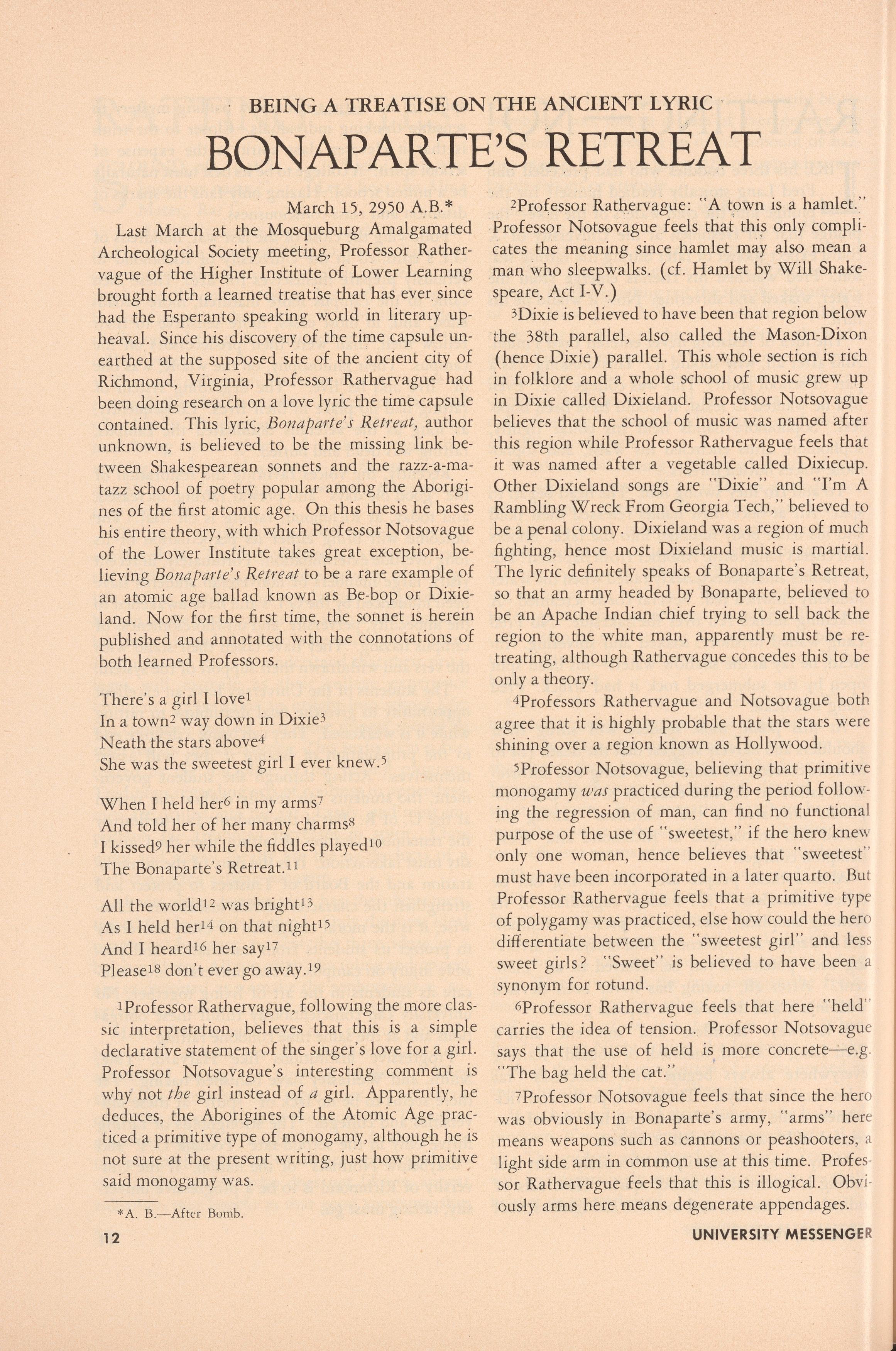
2 Professor Rathervague: "A tpwn is a hamlet. " Professor Notsovague feels that thi~ only complicates the meaning since hamlet may also mean a man who sleepwalks. (cf. Hamlet by Will Shakespeare, Act I-V.)
3Dixie is believed to have been that region below the 38th parallel, also called the Mason-Dixon (hence Dixie) parallel. This whole section is rich in folklore and a whole school of music grew up in Dixie called Dixieland Professor Notsovague believes that the school of music was named after this region while Professor Rathervague feels that it was named after a vegetable called Dixiecup. Other Dixieland songs are " Dixie" and 'Tm A Rambling Wreck From Georgia Tech ," believed to be a penal colony Dixieland was a region of much fighting, hence most Dixieland music is martial The lyric definitely speaks of Bonaparte's Retreat , so that an army headed by Bonaparte, believed to be an Apache Indian chief trying to sell back the region to the white man, apparently must be retreating , although Rathervague concedes this to be only a theory.
4Professors Rathervague and Notsovague both agree that it is highly probable that the stars were shining over a region known as Hollywood.
5Professor Notsovague, believing that primitiv e monogamy was practiced during the period following the regression of man, can find no functiona l purpose of the use of "sweetest, " if the hero knew only one woman, hence believes that "sweetest " must have been incorporated in a later quarto. Bu t Professor Rathervague feels that a primitive typ e of polygamy was practiced, else how could the he ro differentiate between the "sweetest girl" and les s sweet girls? " Sweet " is believed to have been a synonym for rotund.
6Professor Rathervague feels that here " held " carries the idea of tension. Professor Notsovagu e says that the use of held is more concrete-'-e .g. "The bag held the cat. "
7Professor Notsovague feels that since the he ro was obviously in Bonaparte's army , "arms " her e means weapons such as cannons or peashooters, a light side arm in common use at this time Profe ssor Rathervague feels that this is illogical. Obv iously arms here means degenerate appendages.
UNIVERSITYMESSENGER
sprofessors Notsovague and Rathervague feel that at the present time there is not enough evidence to warrant a definite opinion on this highly technical point of charms. It is thought that charms are perhaps bangles ( this age was materialistic) that women of the period were believed to wear on their upper afore-mentioned appendages.
9Both Professors feel that this apparently means a simple buss or buzz of which it is felt there were several forms in common practice by these primitives, but this has not yet been definitely determined
10There seems to be little doubt that the fiddle wa s in use at this time. Obviously since the tense is active, argues Professor Rathervague, a fiddle was a small homo sapiens-or perhaps a fountain, or then again a light, since the lyric definitely states the stars were bright. Professor Notsovague feels tha t "a fiddle" might be a small martial drum used to rally the soldiers to battle.
uprofessor Notsovague, believing Bonaparte to be a leader of either an army or something compara ble, states that this refers to the army retreating-e.g. " The army retreats from battle." Obviously the hero is bidding his love adieu while martial drums (i.e.-"fiddles") summon him to arms ( see footnote 7) . Professor Rathervague, fo llowing a more theological line of thought (Professor Rathervague is something of a theologian), feels that retreat refers to a religious gathering; which strengthens his argument that "fiddles" were perhaps altar boys. Bonaparte comes from the Latin bonus-meaning good-and pars-meaning par t, hence good part.
12A ll the world-e.g. the whole of it. Perhaps the world was believed to be flat.
13Both Professors here are agreed that this phr ase was incorporated in an imperfect quarto some years later to rhyme with night. Since Sir Francis Bacon-a hack writer previous to this period-also edited Shakespeare, Milton and Robert Benchley ( circa 202 5 A.B.), this might be his interpola tion.
14See footnote 6.
15Professor Notsovague feels that night refers to the type of plain on which battles were pitched. Professor Rathervague states that apparently night refers to a temporal condition not day
16By the way this is stated it is believed that the ear was in a more primitive stage of evolution.
17Say-a form of the verb to say, to have said , being said-e.g. I said you said he said she said we OCTOBER, 1950
said you said they said. Obviously this is confusing. It may perhaps lead to a rumor in common practice at that time.
18Professor Rathervague feels that the name of the hero is Please. Other names of the period were Mortimer, Parcivald and Harry Struman.
19Professor Notsovague feels that this line, apparently a plea of the hero-soldier's sweetheart, is the proof of his more martial theory. The soldier is retreating and the girl brashly suggests that he shall stay. The female of the age is thought to have been rather insistent. Professor Rathervague will not commit himself beyond the fact that in all probability this was a term of endearment.
Although the two professors at this time are in violent disagreement as to whether the rare specimen is Be-bop, Razz-a-ma-tazz, or Dixieland, or again something else, they feel that as more evidence is uncovered they will be able to consolidate their findings. Until such time, Bonaparte's Retreat remains the literary puzzle of the age.
-B. C. L. H.

(Continued from page 3)
Just between us, I thought she ought to give him a break. And guess what? She finally did.
It was a sweet ceremony, that pinning. I felt a great surge of pride when I realized I was to be a symbol of that thing called love. I traveled again, although the circumstances this time were more conducive to such a momentous occasion. I became an incurable romantic when, on the misty, moonlit campus, I was placed on Betty's woolly sweater. There were unpleasant moments, nevertheless, as the wild beating of her heart shook me up considerably and the excited screams of the enthusiastic girls gave me a headache. But it was worth it.
As I said in the beginning, I'm still here in Westhampton. It's really a great life, and as you can imagine, full of surprises. Betty kisses me tenderly each night before depositing me on her colorful pajamas. All in all, I've been quite happy in my new surroundings. Sadness fills my heart now though, as I'm soon to be replaced by one of another race. Betty ' s getting a diamond! I guess it's back to the shirt front for me.
-MARY LEE MOORE.
Frat Pin
THE SUBLIMEGESTURE
THE wine glass shattered against the gray wall and Brian threw the last of his paintings on the fire. There was very little else to be done . He might perhaps sweep up the splintered glass, or he might let it lie--a baffling clue to whoever investigated the case. Once more he checked his desk drawers but there was nothing of importance and after careful deliberation, he had decided to leave the few unpaid laundry bills and several old ads as the exquisitely ironic touch. The diaries filled with fifteen years' self-lacerations and dreams that had degenerated into whimpers were now at the bottom of the Hudson River where he had flung them five nights ago Letters, papers and the poems he had written to Ellen were gone. The fate of the poems was quite obviously the most beautifully executed, Brian thought , for one by one he had flushed them down the toilet in a sordid men ' s room in the cheapest waterfront dive the city offered. Brian laughed delightedly The intense little love sonnets to the cool , lovely and insolent Ellen now mingled with the waste of a city , and somewhere now another artist painted or loved his former mistress And perhaps Ellen would laugh at his poems also , and perhaps scar his sensitivity also with accounts of former men who were not failures, who did not periodically take degrading waiter ' s jobs to augment a small inheritance and lack of steady income.
He straightened the narrow black picture frame that did not hold the diploma he had never received from the art school he had attended for only one semester ten years ago. That too was an irony not foregone in the face of Ellen's most piercing laughter. For the world's greatest artist had never sold a picture, and had been firmly discouraged by every critic, dealer , and teacher , in the hundreds of self-debasin g and futile interviews to which Brian had subjected himself. He had known instinctivel y from the first touch of the palette and brush as a schoolboy that he was the world's greatest artist , and only that compelling obsession had allowed him to persist in his art.
Psychologically crucified not only by the art world which, had it not prostituted itself to fad and the critics ' abortive judgment would have recognized his g enius immediately , but also by the swirl of little souled people, passers-by , too constantly immersed in drab existence bounded by 14
morning coffee and nightly debauch, to realize, much less comprehend his position , Brian had been drained of hope and dignity , of all but the last remnant of his dream.
He kicked the empty Chianti bottle under the couch and crossed to all that remained of his art -the one huge canvas that covered the entire west wall of his large attic studio apartment. It was draped with a blue curtain that his garrulous landlady had grudgingly hemmed for him . Pulling the drape back, he surveyed his huge mural-his last creation, the creation that had consumed five years ' time. And its subject was fitting-the creation of the world. The brilliant dynamics of the paintin g as ever electrified him . Boldly he had caught th e cosmic, and the godlike Adam and Eve were deitie s in a paradise so per£ect that no pholosophy ha d ever approximated it in stick-like words . Bria n knelt before it and art and artist were one. He di d not profane it with prayers and his devotion w as reverently brief. And no eyes had ever seen it save his and Ellen's. No dealer had befouled it wit h commercial perusal. Ellen had seen it only on the ir last night together , only then , and terrified , she ha d fled from it. He pulled the blue cloth over th e mural again.
A month ago when he had first concei ved th is idea soon to be reality and had started making his careful plans, the choice of method had brie fly stymied him. A leap from a bridge, a pistol shot, a length of rope , a razor blade-all these involv ed a violence that had left Brian cringing with th eir implications. For hours he had sat inde~isive and staring so that large chunks of the days passed u nnoticed. The final de vice he had hit upon at first seemed inept until he realized that only this meth od would leave his body whole and unmaimed. And with fresh zeal he had set about destroying all traces of his identity as an artist , as a man . It w as now the final moment.
The world's greatest artist untied the string fr om around the druggist's package. Once more he read the note pinned to the blue curtain and once more it seemed the right touch.
BLIND HUMANITY I FORGIVE A ND LEAVE TO IT THE WORLD'S GREAT EST PAINTING
THE WORLD'S GREATEST ARTI ST.
One by one he took the dozen sleeping pills and UNIVERSITYMESSENGER
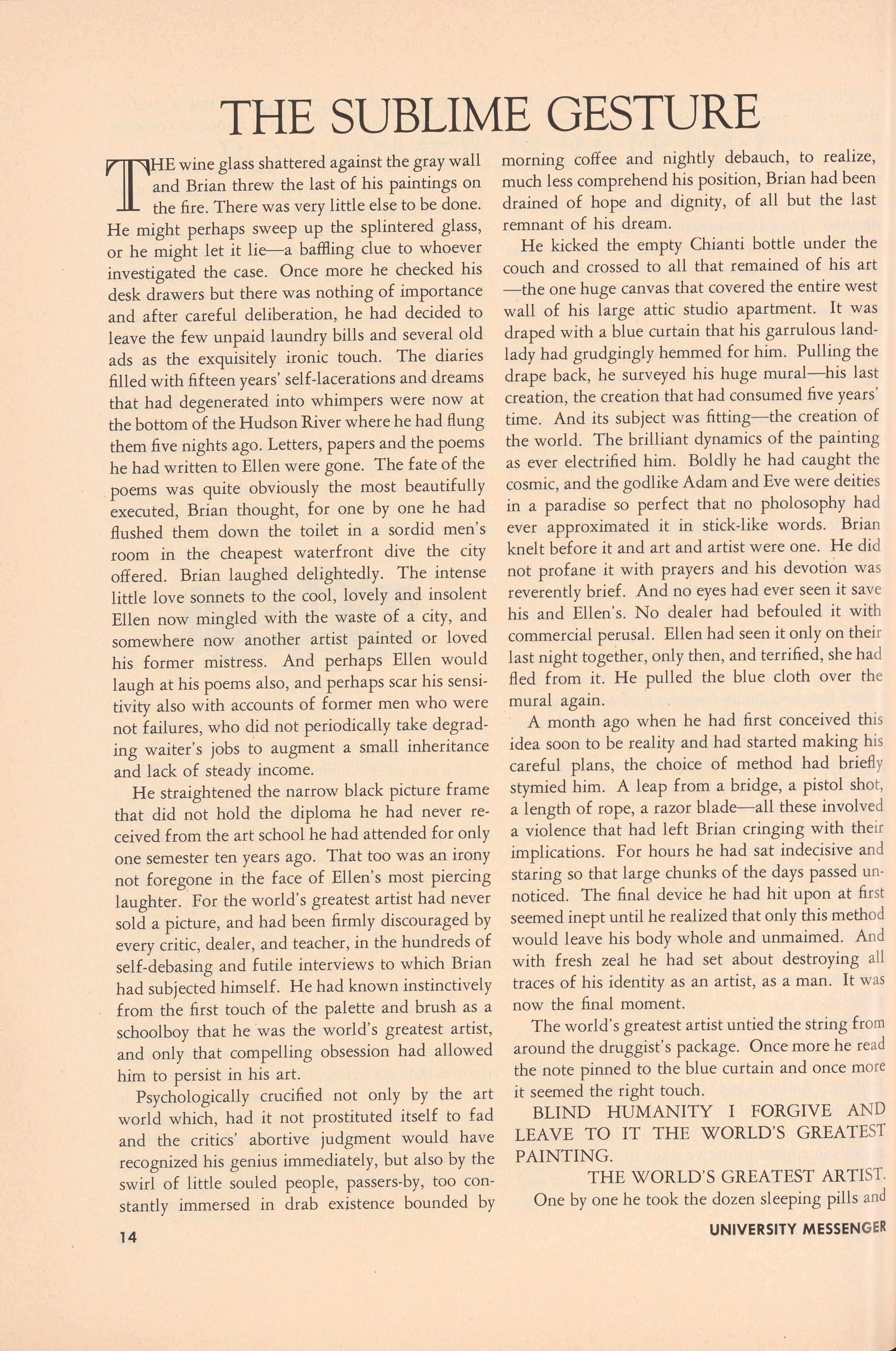
The Sublime Gesture
(Continued from page 14)
threw the emptied water glass against the wall, where it shattered. He lay down on the couch, and wine-drugged already, he closed his eyes_- It was a magnificent sacrifice-to art and to hf e The victorious death. The sublime gesture.
He realized suddenly that he was dressed in his red pajamas. Ludicrous. Hideous. An artist ~hou~d die as his Adam lives-godlike and beautiful rn naked body. Brian tried to rise; his hands fumbled with the buttons-but his limbs were heavy and warm, his body as immobile as a child's in the womb. His mind sickened and crashed. The gesture was marred, for the artist was dying in bizarre red pajamas.
"Go d, I knew he was nuts I knew he was no good from the day he walked in. But I never expected nothin' like this. Never nothin ' like this, officer. I-Oh Lord God
The lieutenant assured Mrs O ' Bannon that her name as well as the name of the tenement would be kep t out of the papers. He cursed silently . If this old hag had phoned headquarters one half hour later, he ' d have been off duty. As it was now Gracie was waiting at the restaurant and, if he knew Gracie, she ' d pout for the first half hour and then probably pick up someone else for the now scanty Saturday night.
" A letter ," shrieked Mrs. O ' Bannon and she seized upon the paper pinned to the blue curtain. She read it aloud to the three policemen "Gawdif I knew an art man , I'd sell it to pay up for the trouble this lunatic's given me. '' Excitedly she drew back the blue curtain.
The large canvas was starkly bare.
-B. B. C.
Desert's End
(Continued from page 7 )
customer and doesn't fear hi less in his taciturn manner.
He asks for coffee and th empty bottle and she sees the request in his eyes and pou rs him a drink. The man and the girl look at each other and ease the truck driver by drinking with him. They do not talk but think and let the
historic in their thoughts. Finally the truck driver tells about the killing and speaks about a group of men who seek the killer and sing a cannibal chant and want to watch the man's lip quiver when he knows that he must die. The man and the girl see each other and say good .Jbye and sit and pour another drink and curse because the bottle is empty The truck driver starts to leave and puts a nickel in the juke box and the man and ,the girl hear someone groan I need you so.
Now they know the future , and whiskey is no good the moment before the world ends. They sit on stools before the lunch counter and are children and make mud pies and see minnows gliding in a stream and wonder why there is no God. The night sounds thicken and come closer and ,their veins pound and a board loses its nail and drops and lies in ,the dust outside the all-night diner.
The group outside move in and want to be upon the man . Their chieftain walks to the door and will not knock , but comes in and tells the man and the girl why he has come. They hate him and fear him and the man leaves his seat and goes to the law-man and says tha,t the tide is high and limps slowly out from the all-night diner. The girl dies and hears his departure and laughs at the cute Petty Girl on the wall calendar. She opens a bottle of beer and contemplates its goodness and loves the bitter malt taste and wonders why her throat hurts and is so dry.
-ROBERT CHADWICK.

recesses of their minds dominate until they are pre- M . R w
OCTOBER,1950
(i I I I
Campus Interviews on CigaretteTests
Number2 ••• THE FLICKER
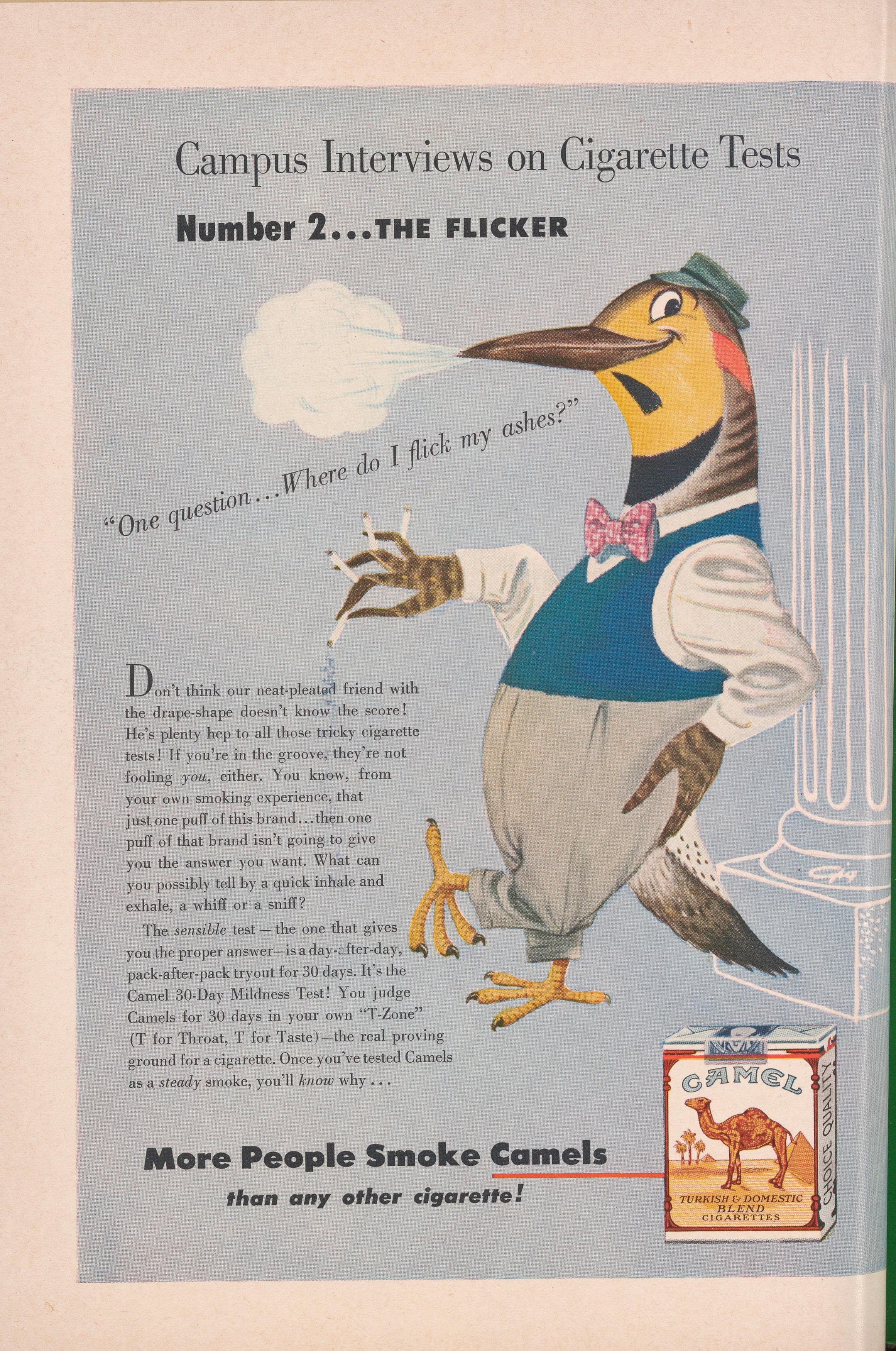
Don't think our neat-pleat@d friend with the drape-shape doesn't know the score! He's plenty hep to all those tricky cigarette tests! If you're in the groove, they're not fooling you, either. You know, from your own smoking experience, that just one puff of this brand ... then one puff of that brand isn't going to give you the answer you want. What can you possibly tell by a quick inhale and exhale, a whiff or a sniff?
The sensible test - the one that gives you the proper answer-is a day-dter-day, pack-after-pack tryout for 30 days. It's the Camel 30-Day Mildness Test! You judge Camels for 30 days in your own "T-Zone" (T for Throat, T for Taste)-the real proving ground for a cigarette. Once you've tested Camels as a steady smoke, you'll know why More People Smoke Camels than any other cigarette!
